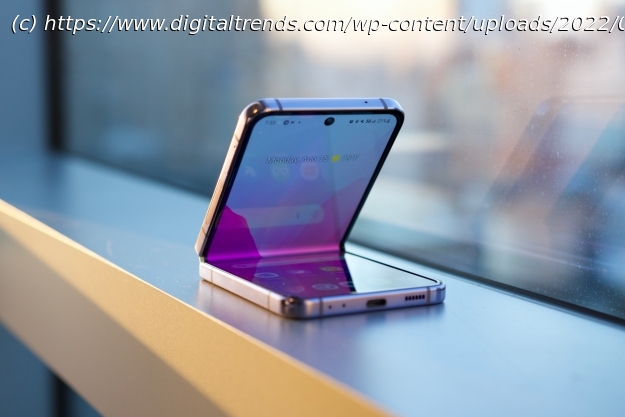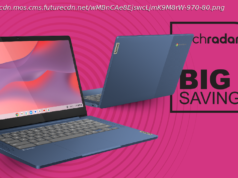The Galaxy Z Flip 4 is Samsung’s latest entry in its flip phone family. It’s like its predecessor, but better in some very key ways. Here’s our full review.
The Samsung Galaxy Z Flip 4 is one of the best folding smartphones you can buy in 2022. Simultaneously, it’s also one of the most boring compared to its predecessor. It’s a fascinating place for the foldable niche to already be. Over the span of only three years, foldables have gone from a breakthrough niche to “just another” smartphone option you can buy. Samsung, specifically, has already gotten so good at the folding formula that it doesn’t have to reinvent the wheel every year. It just has to keep doing what worked the year before.
This year’s Galaxy Z Fold 4 and Z Flip 4 perfectly embody this. But where our Galaxy Z Fold 4 review found some fairly significant changes, that sense of repetition is especially prevalent with the Flip. Compared to the Flip 3, there’s not much new with the Flip 4. It has a slightly tweaked design, a camera that’s a little better, a newer chipset, and a marginally larger battery. It all makes the phone sound quite dull on paper. However, after using the Galaxy Z Flip 4 as my daily driver for the past few days, “dull” is the last word I’d use to describe it.
Is the Galaxy Z Flip 4 a substantial improvement over the Flip 3? No. But is it one of the best foldable phones you can buy today? Absolutely.
If you’ve seen the Galaxy Z Flip 3 before, you’ll be right at home with the Galaxy Z Flip 4. If you haven’t seen a Flip 3, the Flip 4 is essentially a reimagining of the flip phone for the modern era. When it’s open, the Flip 4 looks like any other smartphone — touting a large display, centered hole-punch camera cutout, and slim bezels. But the magic happens when you close the Flip 4. Snap the phone shut, and its hinge mechanism turns it into a compact square you can slide into the tightest of pockets and the smallest of bags.
Samsung made a handful of design improvements this year, starting with the Flip 4’s aesthetics. The rear glass panels have a frostier, matte finish compared to the Flip 3, the frame is flatter, and the hinge holding the phone together is slightly smaller than before. On paper, these changes sound like peanuts. But in practice, they take the Flip 3’s already excellent design and make it even better. The matte glass panels feel luxurious while hiding fingerprints, the flat frame gives the Z Flip 4 an even more distinctive look, and the new hinge — as marginal as it is — does give the Flip 4 a smaller overall footprint.
Speaking of the hinge, it feels every bit as sturdy and reliable as it did on the Flip 3. Like that phone, Samsung says the Z Flip 4 should survive over 200,000 folds during its lifetime — equating to about 100 folds per day throughout five years of use. While I can’t yet speak to how the hinge will feel after a year or two of constant usage, it’s been a champ during my time with the phone.
It opens and closes smoothly, though with enough resistance that it doesn’t feel flimsy. The hinge is also strong enough to be propped up at almost any angle, allowing you to sit the Z Flip 4 on a table with the screen up and facing at you — perfect for hands-free movie watching, video calls, etc.
As for the rest of the phone’s durability, the glass panels and cover screen are covered with Corning Gorilla Glass Victus, the frame is Samsung’s own Armor Aluminum concoction, and the entire device is protected by an IPX8 water-resistance rating (enough to submerge it in up to 1.5 meters of freshwater for up to 30 minutes). There’s still no dust resistance, but for a folding phone, the Galaxy Z Flip 4 is about as durable as it gets.
After two weeks of regular use as my go-to handset, the Galaxy Z Flip 4 has held up just as well as any of my non-folding phones. From the glass panels, cover screen, and main display, everything appears to be in tip-top shape. And that’s without babying the phone at all. I’ve tossed it on coffee shop tables, used it while out in a light drizzle, and (frequently) whipped it open with a flick of the wrist. Just like its predecessor, the Z Flip 4 isn’t a phone you have to baby.
As much as I appreciate the Flip 4’s durability, my favorite design trick is its emphasis on style. By default, Samsung’s website and third-party retailers carry the phone in four hues: Bora Purple, Blue, Pink Gold, and Graphite. Bora Purple is the color Samsung sent me, and I think it’s my favorite of the bunch. It’s a muted lavender color that’s distinctive without being obnoxious, and it contrasts beautifully with the black cover screen. Plus, it looks phenomenal next to the Bora Purple Galaxy Buds 2 Pro.
But if none of those colors catch your eye, Samsung’s website also lets you design the Flip 4 using its Bespoke Studio. Here, Samsung lets you pick and choose the exact colors you want for the Flip 4’s front panel, back panel, and frame – resulting in over 70 possible combinations. It’s unlike anything else available today in the smartphone world and is arguably one of the Flip 4’s best features.
Furthermore, there’s the fun factor that naturally comes with a device like the Galaxy Z Flip 4. It’s not something I can measure with benchmarks or technical analysis, but I can confidently say that this is some of the most fun I’ve had with a phone all year.
From snapping it shut after using an app, propping it up on the counter to watch a YouTube video while I cook dinner, or taking a phone call with the phone slightly bent to resemble the handsets of yesteryear, there are so many unique qualities about the Flip 4 that simply can’t be replicated on a non-folding counterpart. That may not mean anything to some people, but to me, it’s made using the Z Flip 4 an experience I look forward to every time I take it out of my pocket.
We have two screens on the Galaxy Z Flip 4 to judge, but we’ll start with the one you’ll spend the most time with. When opened, the Z Flip 4 treats you to a 6.7-inch Dynamic AMOLED 2X panel. It’s a screen with a 2640 x 1080 resolution, HDR10+ support, 1,200 nits of peak brightness, and a variable refresh rate that scales up to 120Hz and all the way down to 1Hz.
In practice, the screen on the Z Flip 4 looks outstanding. Colors are lusciously vibrant, viewing angles are excellent, and it gets very bright when you need it. Samsung flagships are famous for having some of the best smartphone screens on the market, and even with the foldable form, the Z Flip 4 is no different.
But what about the crease? Every Z Flip handset has a noticeable crease in the middle of the screen where the hinge folds shut, and despite changes to its hinge, the Z Flip 4 is no different — despite what rumors suggested. The crease is still there. You can clearly see it in certain lighting conditions, and you’ll feel it when swiping your finger across it.
But after just a few hours of use, the crease becomes something you subconsciously ignore (just like the notch on an iPhone). I still see it with direct sunlight and feel it when doom-scrolling Twitter, but it’s not something that ever gets in my way of using the Flip 4.
And we have the cover screen. Despite rumors of Samsung enlarging the Flip 4’s cover screen, it’s the same 1.9-inch Super AMOLED 512 x 260 resolution screen that we had on the Flip 3.
Home
United States
USA — software Samsung Galaxy Z Flip 4 review: an (almost) perfect foldable flip phone






